人教版英语七年级上册Unit 6 培优讲义
人教新版英语七年级上册Unit6讲义

人教新版英语七年级上册Unit6讲义单元概述本单元主要介绍了关于旅行和交通工具的词汇和句型。
通过研究本单元内容,学生将能够掌握一些基本的旅行用语,了解不同的交通工具及其用途。
单元目标1. 掌握关于旅行和交通工具的常用词汇,如car, train, bus, bike 等;2. 研究描述交通工具的句型,如"What's this?"和"It's a bike."等;3. 学会询问和回答关于旅行的问题,如"How do you go to school?"和"I go to school by bus."等。
词汇研究本单元涉及的主要词汇有:1. car - 汽车2. train - 火车3. bus - 公交车4. bike - 自行车5. plane - 飞机6. subway - 地铁7. ship - 船8. walk - 步行句型研究本单元涉及的常用句型有:1. What's this? - 这是什么?2. It's a car. - 这是一辆汽车。
3. How do you go to school? - 你怎么去学校?4. I go to school by bus. - 我坐公交车去学校。
练与巩固- 完成课本上的课后练题,巩固对词汇和句型的理解和运用;- 利用课本对话和句型,进行实际对话练,提高口语表达能力;- 设计一份关于交通工具的问卷调查,帮助学生加深对交通工具的了解。
以上为《人教新版英语七年级上册Unit6讲义》的简要内容介绍,希望对您有所帮助。
unit6讲义英语七年级上册
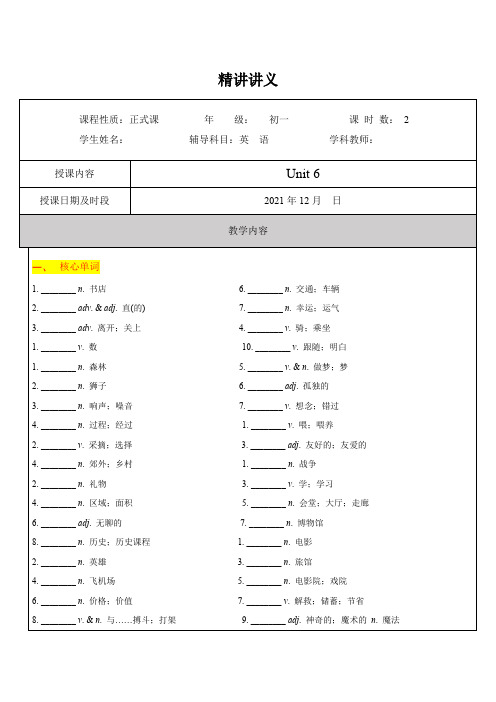
三、 重点句型
1. 我们怎样才能到那里呢? How can we ________ ________?
2. 我们可以乘坐 42 路公共汽车! We can ________ ________ ________!
3. 但是他们在去书店的路上迷路了。
But they ________ ________ ________ ________ ________ ________ the bookstore. 4. 我们正在找书店。
We are ________ ________ the bookstore. 5. 沿着这条街走,在红绿灯处左转。
Go down this street. ________ ________ at the traffic lights. 6. 祝你好运!
精讲讲义
课程性质:正式课 学生姓名:
授课内容 授课
课 时 数: 2 学科教师:
Unit 6
2021 年 12 月 日 教学内容
一、 核心单词
1. ________ n. 书店 2. ________ adv. & adj. 直(的) 3. ________ adv. 离开;关上 1. ________ v. 数 1. ________ n. 森林 2. ________ n. 狮子 3. ________ n. 响声;噪音 4. ________ n. 过程;经过 2. ________ v. 采摘;选择 4. ________ n. 郊外;乡村 2. ________ n. 礼物 4. ________ n. 区域;面积 6. ________ adj. 无聊的 8. ________ n. 历史;历史课程 2. ________ n. 英雄 4. ________ n. 飞机场 6. ________ n. 价格;价值 8. ________ v. & n. 与……搏斗;打架
人教版七年级英语上册Unit6整单元精品PPT课件
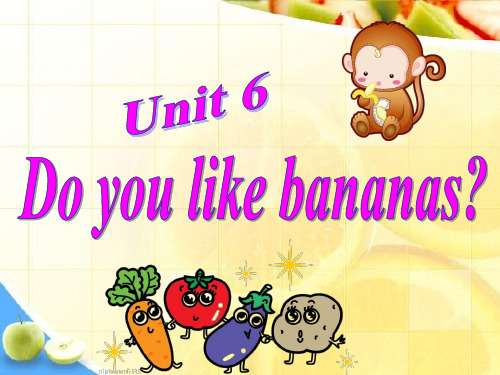
3. John likes burgers, salad, apples and __A__.
A. strawberries B. pears
C. banana
1. tomatoes 西红柿 tomatoes是tomato的复数形式。
My sister likes tomatoes very much. 我姐姐喜欢吃西红柿。
Her/His name is... She/He likes... ...and... ,but she/he doesn't like ...and...
一、看图说出下列物品的英语单词。
fruit tomatoes oranges strawberries
pears bananas food
bread
Are you ready?
(你们准备好了吗?)
试一下单词的复数
可数名词 (countable noun)
apple
— apples
pear
— pears
hamburger — hamburgers
banana — bananas
orange — oranges
strawberry — strawberries
2 A: Do you like salad? B: No, I don’t.
1 A: Do you like bananas? B: Yes, I do.
3 A: Do you like oranges? B: Yes, I do.
1c
Do you like bananas?
Practice the conversation above. Then make your own conversations.
最新人教版七年级上Unit6全单元课件
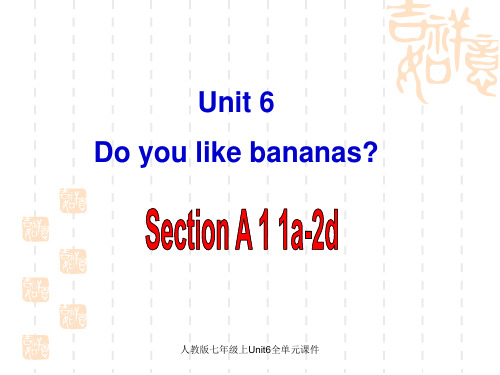
1 B: Yes, I do. A: Do you like oranges?
3 B: Yes, I do.
人教版七年级上Unit6全单元课件
1c Practice the conversations above with your partner. Then make your own conversations.
Bill: Sounds good. John likes hamburgers.
Jack: Oh, I don’t like salad. Bill: But John likes salad,
and it’s his birthday. Jack: Yes, you’re right.
What about the fruit? Tom: I think John likes strawberries and apples. Bill: OK. Let’s have strawberries and apples then.
人教版七年级上Unit6全单元课件
2d Role-play the conversation.
Jack: Hey, John’s birth day dinner is next week. Let’s think about the food.
Tom: Sure. How about burgers, vegetable salad, and some fruit?
strawberry --- strawberries
rice
tomato ---- tomatoes
人教版初一英语上册unit6
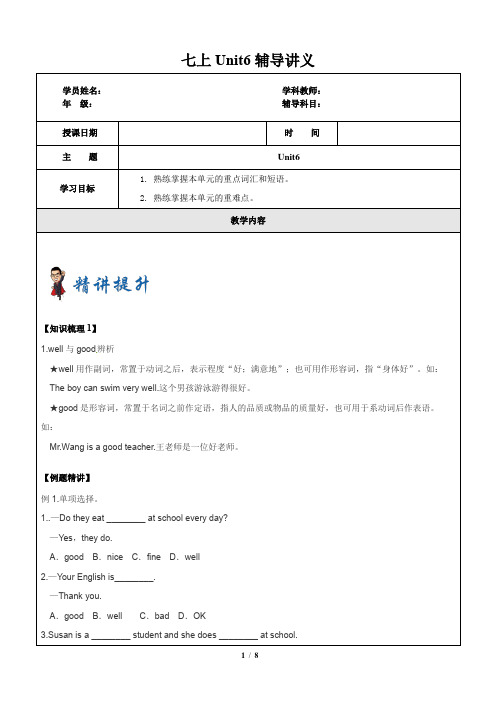
七上Unit6辅导讲义学员姓名:学科教师:年级:辅导科目:授课日期时间主题Unit61. 熟练掌握本单元的重点词汇和短语。
学习目标2. 熟练掌握本单元的重难点。
教学内容【知识梳理1】1.well与good辨析★well用作副词,常置于动词之后,表示程度“好;满意地”;也可用作形容词,指“身体好”。
如:The boy can swim very well.这个男孩游泳游得很好。
★good是形容词,常置于名词之前作定语,指人的品质或物品的质量好,也可用于系动词后作表语。
如:Mr.Wang is a good teacher.王老师是一位好老师。
【例题精讲】例1.单项选择。
1..—Do they eat ________ at school every day?—Yes,they do.A.good B.nice C.fine D.well2.—Your English is________.—Thank you.A.good B.well C.bad D.OK3.Susan is a ________ student and she does ________ at school.A.well;good B.good;good C.well;well D.good;well【巩固练习】用good或well填空。
1.—Does h is friend play football_________?—No,he doesn't.2.—Let's play volleyball after class.—That sounds _________.3.—Is this a_________ book?—Yes,it is.4.—How is your father?—He is _________.Thank you..【知识梳理2】2.chicken的用法★chicken作名词,意为“鸡肉”,此时为不可数名词;意为“小鸡”时,是可数名词,复数形式为chickens。
Unit6(单元解读课件)七年级英语上册(人教版)
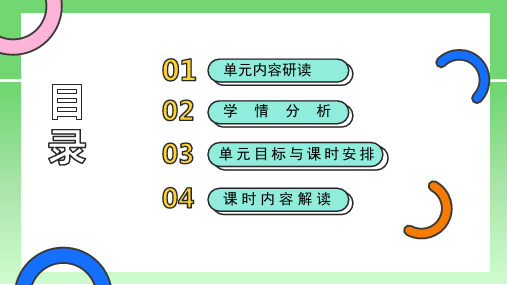
单元主题:人与社会
教材 语篇 板块 形式
语篇内容
语篇意义
核心词汇与句型 技能与策略学 习要点
第三 课时 Sect ion B 1a1e
听力 对话
该部分是一篇听力对话,该对话的 主要内容是Sally和Tom之间谈论彼 此喜欢的事物。 Sally不喜欢蔬菜, 但是喜欢吃沙拉和水果,而Tom喜 欢所有的蔬菜但是不喜欢苹果。
学习理解 应用实践
迁移创新
第一课时 SectionA 1a-2c 课时内容解读
单元主题:人与社会
教材 语篇 语篇内容 板块 形式
语篇意义
核心词汇与 句型
技能与策略 学习要点
第一 节 Secti on A 1a-2c
听力 对话
1a首先通过主题图展示在餐 该 语 篇 展 示 如 何 词汇:
1. 掌握关
式也有利于学生认识 到英语的语用能力, 在联系对话时,提升 口语交际能力。
词汇: so, breakfast, lunch,star, eat, well, habit, healthy, really,question,want, be, fat 句型: So what fruit do you like? I like chichen for dinner.
统筹课时安排
教材板块
课型
第*课时
课时目标
学习层次
第一节 SectionA
1a-2c
听说课
第二节 SectionA
2d-3c
语法课
第一课时 第二课时
1.掌握可数名词单数变复数的规律。 2.能正确使用所学句型,与同学进行简单的关于 食物喜恶的谈论。 3. 掌握可数名词和不可数名词之间的区分
1. 掌握含有实义动词like的肯定句、否定句和一 般疑问句的用法 2. 掌握可数名词单数变复数的规律。 3. 能正确使用所学的语法和句式结构来表达对事 物以及其他事物的态度并与同学进行交流。
初中人教版新目标英语七年级上册课件Unit6-SA

过去时态
描述已经发生的动 作或状态
形容词和副词
形容词的用法
用于描述名词的特征或性质
副词的用法
用于修饰动词、形容词或其他 副词
比较级与最高级
用于比较不同事物的程度或水 平
01 常用介词
指在语言中常见的位置或方向的介词
02 连词的分类
连接句子内部或句子之间的词语
03 介词短语和连词短语的使用
在句子中起到修饰或连接的作用
能力。
提高理解能力
通过不断阅读和解 析文章,逐渐提高 对语言表达和逻辑 推理的理解能力。
阅读不同领域 的文章
拓展阅读领域,可 以帮助提高对不同 主题的理解能力,
增加知识面。
01 阅读报纸
通过阅读报纸了解时事动态,丰富知识储备,提高 对社会事件的了解能力。
02 阅读故事书
阅读故事书可以激发阅读兴趣,培养想象力,提高 语言表达能力。
Practice using the following sentences to improve your grammar skills: 1. I like playing football. 2. She goes to school by bus. 3. They have lunch at 12 o'clock.
happening at the moment
of speaking.
Comparative and Superlative DAesdcrjiebicntgitvhee dsegree of a
quality or characteristic in
relation to others.
句子练习
03
总结
通过交流互动这一环节,学生们不仅可以提高自己的口语表 达能力和演讲技巧,还能培养团队合作精神和自信心。这对 于学生们的成长和发展至关重要,也是英语学习的必经之路。
人教版七年级上册Unit6完整ppt课件

hamburgers
tomatoes
ice-cream
ice-cream
to精m选aptpot课es件
16
Food
Name
tomatoes
I
Bill
Report:
I like tomatoes, ice-cream and salad. But I don’t like hamburgers or carrots.
11
bananas oranges strawberries
hamburgers
milk
ice-cream
Do you like bananas ? Yes,I do./No, I don’t.
bread tomatoes salad
精选ppt课件
12
Look and say
转换人称
A:D__o_es__he _li_k_e_ _st_r_a_w_b__er_r_i_e_s? B: No, _h_e_d_o_e_s_n_’_t_.
Grammar Focus
2. 是的。Y__e_s_, I __d_o_.
不,不喜欢。_N__o__, I __d_o_n__’t.
3. 他们喜欢梨吗?
D_o___ _t_h_e_y_ like pears?
4. 是的。Y__e_s_, they ___d_o.
不喜欢。N_o__, they __d_o_n__’t.
My friend Bill likes strawberries and milk. But he doesn’t like tomatoes or hamburgers.
精选ppt课件
17
2d
Read 2d. Then choose the right answers.
Unit6讲义人教版英语七年级上册
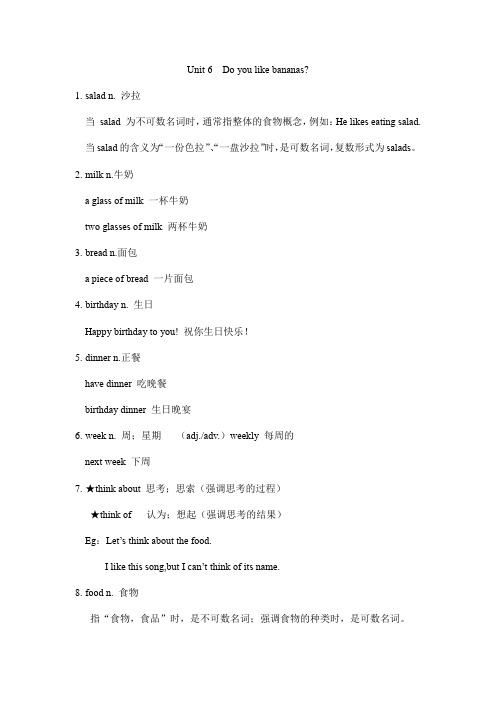
Unit 6 Do you like bananas?1.salad n. 沙拉当salad 为不可数名词时,通常指整体的食物概念,例如:He likes eating salad.“一盘沙拉”时,是可数名词,复数形式为salads。
当salad的含义为“一份色拉”、k n.牛奶a glass of milk 一杯牛奶two glasses of milk 两杯牛奶3.bread n.面包a piece of bread 一片面包4.birthday n. 生日Happy birthday to you! 祝你生日快乐!5.dinner n.正餐have dinner 吃晚餐birthday dinner 生日晚宴6.week n. 周;星期(adj./adv.)weekly 每周的next week 下周7.★think about 思考;思索(强调思考的过程)★think of 认为;想起(强调思考的结果)Eg:Let’s think about the food.I like this song,but I can’t think of its name.8.food n. 食物指“食物,食品”时,是不可数名词;强调食物的种类时,是可数名词。
9.right adj. 正确的;—(反义词)wrong 错误的adj. 右边的;—(反义词)left 左边的★All right!用作对方建议或劝告的应答语。
Eg:—Let’s go and ask him.让我们去问他。
—All right. 好的。
10.star n. 星星;明星a volleyball star 一个排球明星11.eat v. 吃★eating habits 饮食习惯12.well adv. 好;令人满意地(adj.)good 好的Eg:Sports Star Eats Well.I have good eating habits.13.question n. 问题one last qusetion 最后一个问题14.healthy adj. 健康的(n.)health 健康★keep healthy 保持健康15.want v. 想要want sth. 想要某物want to do sth. 想要做某事want sb. to do sth. 想要某人做某事Eg:I don’t want to be fat.16.—What do you like for breakfast?—I like ........【语法】名词的单复数有些名词既可作可数名词又可作不可数名词,但意义不同,要注意区分.①glass cn.杯子un.玻璃orange cn橘子un.橘汁①还有表示动物类的名词,表示动物时是可数名词,表示为菜肴时是不可数名词. chicken cn.小鸡un.鸡肉fish cn鱼un鱼肉①salad, icecream, food, fruit 作总称讲是不可数名词,作种类讲是可数名词【即学即练】一、请写出下列词的复数形式city _____ _zoo ______country _____ tooth ____mouse _________ boy____________ broom ___________car ____tree ______horse ______ bus______________ fox _____branch ____ baby _____ family _____ dish _____radio _____ photo _____ piano _____ knife _____leaf _____ life _____ thief _____ _man _____woman _____ child ___ foot______this _____________ watch___________ diary____________ day____________ book____________dress____________ sheep___________ tea_____________ box___________ strawberry_________ peach__________ sandwich__________ paper_________ juice__________ water____________ milk___________ rice__________people ______CD________ ox___________deer____________ fish___________二、选择填空.( )1. They e from different ______A. countryB. countriesC. a countryD. countrys( )2. How many ______ do you see in the picture?A. tomatosB. tomatoesC. tomatoD. the tomato( )3. They are______.A . woman teachers B. women teachersC. women teacherD. woman teacher( )4. Would you like _______ ,please?A. two glass of waterB. two glasses of waterC. two glass of watersD. two glasses of waters( )5. Most of ______ live in _______.A. Germans, GermanB. German, GermenC. Germen, GermanyD. Germans, Germany( )6. There are some ______ in these _______.A. knifes pencilboxesB. knives pencilsboxC. knives pencilboxD. knives pencilsboxes( )7. ______ like ______ by air.A. Greens, travellingB. The Green, travelingC. The Greens, travelD. The Greens, traveling( )8. I wonder why ______ are interested in action films(武打片).A. the peopleB. peopleC. peoplesD. the peoples( )9. There is no ______ in the plate.A. applesB. orangesC. riceD. eggs( )10.My uncle has three _______.A.childB.childsC.childrenD.childrens四.填入所给名词的正确形式。
人教版七年级英语上册第六单元全单元课件精编版

人教版七年级英语上册第六单元全单元课件精编版教学内容:Unit 6 Do you like bananas?教材解读本单元主要讨论各种食物以及喜欢或不喜欢某种食物;询问某人是否喜欢某种食物及回答;会描述一日三餐,会合理搭配一日三餐。
like的一般现在时、一般疑问句及肯、否定回答;肯定句和否定句。
通过本单元的学习,认识到在平日饮食中要做到不挑食、不偏食、合理饮食。
教学目标一、知识与技能1. 掌握基本词汇:food、banana、hamburger、tomato、broccoli、French fries、strawberry、orange、ice cream、salad。
2. 掌握句型:Do you like bananas? Yes, I do./No, I don’t.二、过程与方法通过听说读写等任务型活动,熟练应用所学单词和动词词组。
三、情感态度和价值观认识并了解各种食物,能分清水果和蔬菜并能认识到水果和蔬菜对人体有益。
通过询问对方是否喜欢某食物来引起话题。
教学重点基本单词、词汇和句型。
教学难点1. 认识并掌握重点词汇。
2. 能流利地与对方开展关于食物喜好的'对话。
教法导航采用任务型教学途径并配以多媒体辅助教学,同时考虑学生的不同层次采取分层递进的教学方法。
学法导航让学生在游戏的情景中感受到轻松愉悦、民主和谐的环境气氛,学生积极主动参与,从而产生了强烈的求知愿望,增强学习兴趣。
教学准备PPT、关于食物的图片。
教学过程Step 1: Greetings. Greet the students as usual.Step 2: Revision Show the students pictures and ask:What’s this? It’s a soccer ball. Do you have a soccer ball? Yes, I do./No, I don’t. Do you like it? Yes, I do./No, I don’t.Step 3: New words Show the students some food and ask: 2 What’s this? It’s a hamburger. Do you like it? Yes, I do./No, I don’t.What are these? They’re bananas. Do you like bananas? Yes, I do./No, I don’t.运用图片和对话教学单词:hamburger、banana、tomato、broccoli、French fries、strawberry、orange、ice cream、salad,并运用这些单词进行对话。
2013新课标人教版七年级上册英语第6单元全解讲义

Unit 6 Do you like bananas?教材知识全解Section A1、D o you like bananas?你喜欢香蕉吗?这是一个含有实义动词的like的一般疑问句。
其句子结构如下:(1)一般疑问句,其格式是:Do/Does+主语+like+其他?肯定回答:Yes,主语+ do/does;否定回答:No,主语 + don’t/doesn’t。
主语是第一、二人称或第三人称复数时用do,主语是第三人称单数时用does。
例如:——Do they like salad?(写出句子的肯定回答和否定回答)——_________________________________/——________________________________ ——Does she like salad?(写出句子的肯定回答和否定回答)——_________________________________/——________________________________(2)其肯定句格式是:主语+like/likes+其他;主语是第一、二人称或第三人称复数时用like,主语是第三人称单数时用likes。
例如:I like the photo.He likes ice-cream.(3)其否定句格式是:主语 + don’t/doesn’t + like + 其他;主语是第一、二人称或第三人称复数时用do,主语是第三人称单数时用does。
例如:He ________ ___________ bananas.(他不喜欢香蕉。
)I ________ _____________ the red pencil box.(我不喜欢这个红色铅笔盒。
)2、Let’s have ice-cream. 我们吃冰淇淋吧。
have 是动词,意为“吃;喝;有”等。
have 属于多义词,在不同的句子中有不同的意思,学习中要注意积累。
人教版新目标七年级英语上册 Unit 6 Section B (Self Check) 培优训练(

人教版新目标七年级英语上册Unit 6Section B (sel fcheck)培优训练一、单项选择( ) 1.He has ____ egg and ________ hamburger for breakfast.A.an, an B.a, a C.an, a D.a, an( ) 2.I like ____ and ________.A.chickens, strawberryB.chicken, strawberriesC.chicken, strawberryD.chickens, strawberries( ) 3.I ____ hamburgers and my brother ________ salad.A.like, like B.like, likesC.likes, like D.likes, likes( ) 4.Volleyball stars must eat ____ and have ________ habits.A.good, good B.good, wellC.well, good D.well, well( ) 5.—____ does your father have ________ lunch?—Rice and vegetables.A.What, for B.What, inC.How, for D.How, on( ) 6.My sister likes fruit,____ she doesn't like vegetables.A.and B.so C./ D.but( ) 7.—Does his sister like carrots?—____.A.Yes,she does B.No,she doesC.Yes,he does D.No,she isn't( ) 8.I like vegetable salad,and I eat ____ for dinner.A.them B.they C.its D.it( ) 9.—Do you like ____?—Yes,I eat them every day.A.meat B.hamburgersC.water D.salad( ) 10.—How about some hamburgers and fruit?—____.A.You're right B.Sounds greatC.He doesn't like them D.Let's have some( ) 11.He has ____ egg and ________ hamburger for breakfast. A.a;an B.an;a C.an;an D.a;a( ) 12.Some food ____ on the table.A.are B.is C.am D.be( ) 13.—____ does your father have ______ lunch?—Rice and chicken. A.What;for B.How;forC.What;in D.How;in( ) 14.Dale and Eric ____.A.likes tomatoes B.likes tomatoC.like tomatoes D.like tomato( ) 15.—I like pears.____?—I like bananas.A.Do you like them B.Do you like bananasC.What about you D.What about yours二、词汇运用A) 根据句意及汉语提示写单词。
人教版七年级上册unit6讲义
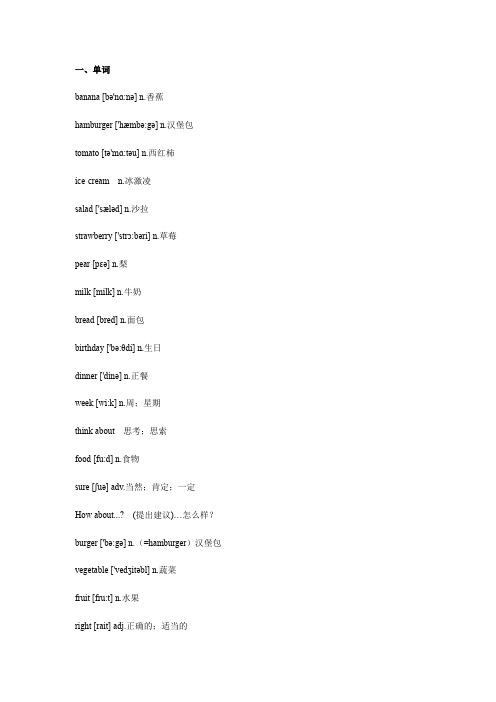
一、单词banana [bə'nɑ:nə] n.香蕉hamburger ['hæmbə:gə] n.汉堡包tomato [tə'mɑ:təu] n.西红柿ice-cream n.冰激凌salad ['sæləd] n.沙拉strawberry ['strɔ:bəri] n.草莓pear [pɛə] n.梨milk [milk] n.牛奶bread [bred] n.面包birthday ['bə:θdi] n.生日dinner ['dinə] n.正餐week [wi:k] n.周;星期think about 思考;思索food [fu:d] n.食物sure [ʃuə] adv.当然;肯定;一定How about...? (提出建议)…怎么样?burger ['bə:gə] n.(=hamburger)汉堡包vegetable ['vedʒitəbl] n.蔬菜fruit [fru:t] n.水果right [rait] adj.正确的;适当的apple ['æpl] n.苹果then [ðen] adv.那么egg [eg] n.蛋;鸡蛋carrot ['kærət] n.胡萝卜rice [rais] n.大米;米饭chicken ['tʃikin] n.鸡肉so [səu] conj.那么breakfast ['brekfəst] n.早餐;早饭lunch [lʌntʃ] n.午餐star [stɑ:] n.明星;星星eat [i:t] v.吃well [wel] adv.好;令人满意的habit ['hæbit] n.习惯healthy ['helθi] adj.健康的really ['riəli] adv.真正地question ['kwestʃən] n.问题want [wɔnt] v.需要;想要be [bi:] v.变成fat [fæt] adj.肥的;肥胖的n.脂肪;肥肉重点单词1.dinnern. (中午或晚上吃的)正餐dinner 指一日中的主餐,可中午吃,也可晚间吃。
人教版新目标七年级英语上册 Unit 6 Section A (1a-_2d) 培优训练(有答案)
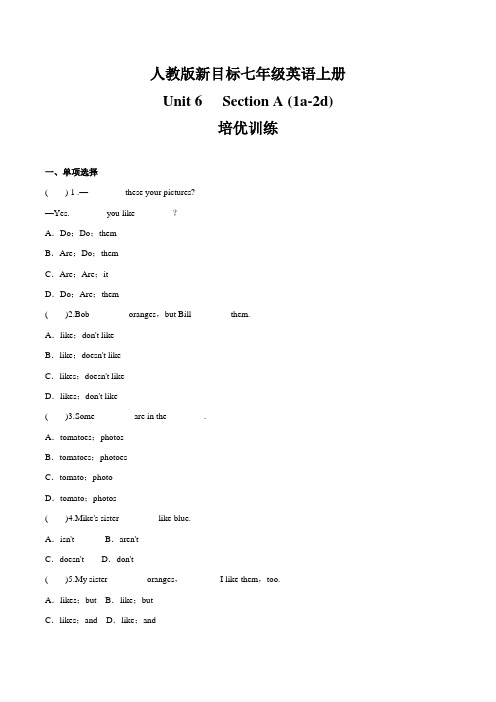
人教版新目标七年级英语上册Unit 6Section A (1a-2d)培优训练一、单项选择( ) 1 .—________ these your pictures?—Yes.________ you like ________?A.Do;Do;themB.Are;Do;themC.Are;Are;itD.Do;Are;them( )2.Bob ________ oranges,but Bill ________ them.A.like;don't likeB.like;doesn't likeC.likes;doesn't likeD.likes;don't like( )3.Some ________ are in the ________.A.tomatoes;photosB.tomatoes;photoesC.tomato;photoD.tomato;photos( )4.Mike's sister ________ like blue.A.isn't B.aren'tC.doesn't D.don't( )5.My sister ________ oranges,________ I like them,too.A.likes;but B.like;butC.likes;and D.like;and( )6.—Let's ________ some bread. —Oh,no.I don't like ________.A.have;it B.has;itC.have;them D.has;them( )7.—What ________ does your sister like? —She likes oranges.A.color B.sportC.number D.fruit( )8.—________ some carrots? —Sounds good.A.Do you like B.What areC.Where are D.How about( )9.I don't like ________.A.pear B.bananaC.ice-cream D.hamburger( )10.—Let's ________tomatoes!—Oh,no,I ________tomatoes.A.to have;don't likeB.have;doesn't likeC.have;don't likeD.has;don't like二、词汇运用A) 根据句意及汉语提示写单词。
- 1、下载文档前请自行甄别文档内容的完整性,平台不提供额外的编辑、内容补充、找答案等附加服务。
- 2、"仅部分预览"的文档,不可在线预览部分如存在完整性等问题,可反馈申请退款(可完整预览的文档不适用该条件!)。
- 3、如文档侵犯您的权益,请联系客服反馈,我们会尽快为您处理(人工客服工作时间:9:00-18:30)。
Unit 6 培优讲义
“专有名词”和“普通名词”两大类。
1)专有名词主要指人、地方、组织、机构等的专有的名称。
如:Gina, China。
专有名词的首字母要大写。
2)普通名词又可分为下面四类:
①个体名词:表示某类人或东西中的个体。
如pen, student, apple。
①集体名词:表示若干个体组成的集合体。
如family, class。
①物质名词:表示无法分为个体的物质。
如water, broccoli等。
①抽象名词:表示动作、状态、品质、情感等。
如work, happiness等。
★个体名词和集体名词都是可数名词,物质名词和抽象名词都是不可数名词。
3)有些名词既可作可数名词又可作不可数名词,但意义不同,要注意区分。
①glass C. 杯子U 玻璃orange C 橘子U. 橘汁
①还有表示动物类的名词,表示动物时是可数名词,作为菜肴时是不可数名词。
chicken C 小鸡U 鸡肉fish C.鱼U. 鱼肉
①salad, ice cream, food, fruit 作总称讲是不可数名词,作种类讲是可数名词
● I like spicy food. 我喜欢辛辣的食物。
(总称)
●There are all kinds of foods on the table. 桌子上有各种各样的食物。
(类别)
1)v. 喜欢反义词:dislike/hate
① like sb. / sth.喜欢某人/某物
●I like pop music. 我喜欢流行音乐。
① like to do sth.喜欢/想要做某事(表一次性或特指的某一具体的动作)
●I like to eat hamburgers today. 我今天想吃汉堡包。
① like doing sth喜欢做某事(表习惯性的动作或爱好)
●I like watching TV. 我喜欢看电视。
拓展:would like to do=want to do 想要做某事feel like doing sth 想要做某事
其他“喜欢”的表达方式:enjoy/love/prefer/be fond of/be interested in (doing) sth
2)prep. 像
①be like 像
●He is like a father to me. 他就像是我的父亲。
①look like 看起来像
●What does your brother look like? 你的哥哥长什么样子?
拓展:sound like 听起来像feel like 感觉像seem like 似乎
3)n. “爱好(常复数)
●Could you tell me your likes and dislikes? 你可以告诉我你的喜好吗?
动名词作定语时,在句子中通常有两个位置:如果是单个的动名词作定语,常放在被修饰的名词前面作前置定语;如果是动名词短语作定语,则放在被修饰名词的后面,作后置定语。
●I have healthy eating habits. 我有健康的饮食习惯。
(前置定语)
●The man standing under the tree is my father. 站在树下的那个男人是我的爸爸。
(后置定语)
1)think 短语
①think of认为;想起;考虑
●What do you think of it?=How do you like it? 你认为它怎么样?
①think about 考虑;想一想think over 仔细考虑think up想出think back 回想think for yourself 独立思考
2)I think so. 我也这样认为。
I don’t think so. 我不这样认为。
3)否定转移:I think. You aren’t right .(合并为一句)→I don’t think you are right. 我认为你不对。
拓展:do you think作插入语:通常放在what, who,when等特殊疑问句之后,句子语序用陈述语序。
What do you think I can do for you? (陈述语序)
12. I don’t want to be fat. 我不想变胖。
v. 意为“想要、需要”=would like
①want sth 想要某物。
●I want an apple. 我想要一个苹果。
①want to do sth想要做某事。
●I want to eat an apple. 我想要吃一个苹果
①want sb to do sth. 想要某人做某事。
●I want you to help me.want to be…
④“想要成为……;想要变得……”,动词be后接形容词或名词。
●Do you want to be a teacher? 你想成为一名老师吗?
● I don’t want to be old! 我可不想变老!
拓展:
①sth. want doing 某事需要被做
●The flowers want watering. 花需要被浇水了。
①sb. wanted for…为…招聘
an English teacher wanted for our school 学校招聘一名英语老师
how about=what about +n./v-ing 用来表建议,“怎么样”
● What about this one? 这个怎么样?
● How about going shopping? 去购物怎么样?
拓展:其他常用的表示建议的句式
①Let’s do sth.
●Let’s play games. 让我们玩游戏吧。
①Why not/why don’t you do sth? 为什么不做…?
●Why not come with me?=Why don’t you come with me? 为什么不跟我一起?
①had better do sth 最好事做…I had better=I’d better you had better=you’d better ●You’d better drink more water. 你最好是多喝水。
